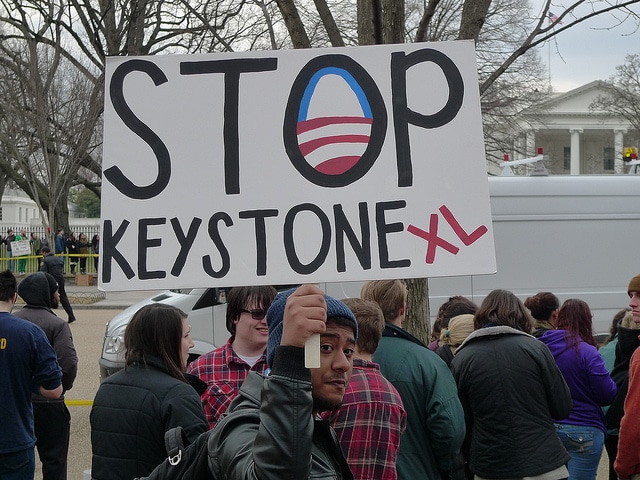The White House confirmed today that President Obama will veto Congressional legislation designed to greenlight construction of the Keystone XL pipeline, the contentious project first proposed six years ago to carry more than 800,000 barrels per day of Canadian oilsands crude from Alberta to refineries and export facilities along the Gulf of Mexico.
Despite strong indications of support in Congress, the Obama Administration has already indicated it will veto the bill to expedite approval of the $8 billion project if approved. A similar bill was blocked by Democrats in the Senate in November.
“If this bill passes this Congress the president won’t sign it either,” Josh Earnest, White House press secretary, said. Obama rejected TransCanada’s application to build the pipeline in 2012, suggesting congressional Republicans had set a “rushed and arbitrary deadline” for the project’s approval.
The bill, proposed by Republican Senator John Hoeven from North Dakota and Democratic Senator Joe Manchin from West Virginia, will be debated in a Senate Energy and Natural Resources Committee hearing Wednesday with the panel set to vote on the project Thursday.
“For us to continue to produce more energy and compete in the global market we need more pipelines to move crude at the lowest cost and in the safest, most environmentally friendly way,” Hoeven said in a recent press conference. “That means that pipelines like the Keystone XL are in the vital national interest of our country.”
According to Danielle Droitsch, director of the Canada Project at the Natural Resources Defense Council, Obama “made the right call.”
“What’s needed now is for him to kill the dirty tar sands pipeline outright,” she said in a statement.
Droitsch said the president is clearly focused on the question of national interest.
“On principle, the president is right to put the national interest first. It’s not the role of Congress to short-circuit the legitimate process of presidential review designed to ensure the best outcome for the country.”
She added Keystone XL “would pipe some of the dirtiest oil on the planet through the breadbasket of America so most of it could be shipped overseas. It’s not a plan to help our country. It’s about big profits for big oil – and big pollution for the rest of us.”
The president indicated he will stick to the official pipeline review process and noted an ongoing challenge to the pipeline’s route through Nebraska has yet to be resolved.
In addition to massive public opposition to the pipeline, plummeting oil prices are calling into question both the short and long-term viability of North American oil projects.
As Canadian economist Jeff Rubin recently put it in a Globe and Mail op-ed, the political economy of oil is rapidly changing our relationship with fuel transport infrastructure:
“The first thing Canadians should recognize about the new world order for oil prices is that – contrary to what we’re being told by our federal government – the economy is no longer in dire need of any new pipelines. For that matter, it can live without the new rail terminals being built to move oil as well. Yesterday’s transportation bottlenecks aren’t relevant in today’s marketplace.
At current prices there won’t be any massive expansion of oil sands production because those projects, which would produce some of the world’s most expensive crude, no longer make economic sense.”
Bill co-sponsor Joe Manchin – one of the few Democrats to support the pipeline – said he is encouraged by the fact that the Keystone XL bill is one of the first pieces of legislation this year.
“We have everything to gain by building this pipeline, especially since it would help create thousands of jobs right here at home and limit our dependence on foreign oil,” he said.
Yet to the White House, the move is symbolic of potential discord with the Republican-led Congress.
“Congressional Republicans are well aware of the position of this administration, which is that we believe clearly that this administrative process is the one that should determine the viability of this project and that is a long held view,” White House press secretary Earnest said.
“So it may raise questions about the willingness of Republicans to actually cooperate with this administration when you consider that the very first bill that is introduced in U.S. Senate is one that Republicans know the president opposes,” he added.
According to The Hill, Hoeven and Manchin already have a plan to push passage of the pipeline legislation later in the year, despite Obama’s veto.
Image Credit: Susan Melkisethian via Flickr
Subscribe to our newsletter
Stay up to date with DeSmog news and alerts






